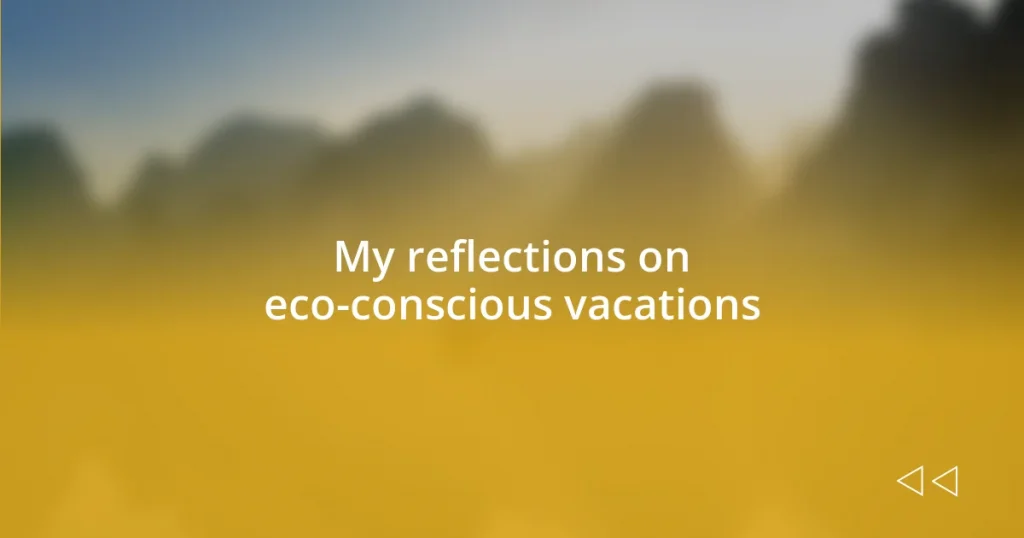Key takeaways:
- Eco-conscious vacations prioritize sustainable travel choices that positively impact both the environment and local communities.
- Choosing eco-friendly accommodations and supporting local businesses enhances personal connections and enriches the travel experience.
- Engaging in responsible travel practices, like conservation efforts and using public transportation, fosters a deeper appreciation for the destinations visited.

Understanding eco-conscious vacations
Eco-conscious vacations are more than just a trend; they’re a way to travel with intention and respect for the planet. I remember my first trip where I chose to stay at an eco-lodge. The experience was eye-opening; seeing how sustainable practices can enhance the beauty of nature made me realize how each travel choice impacts our environment.
When I think about planning a getaway, I often ask myself, how can I leave a place better than I found it? Eco-conscious vacations encourage that mindset. Whether it’s opting for local foods, reducing waste, or choosing sustainable transportation, every small action plays a role in preserving the locations we cherish.
It’s fascinating to see how many travelers are now prioritizing eco-friendly practices. For instance, during a recent trip, I engaged with a local community that was committed to conserving their natural resources. Their passion was infectious, reminding me that eco-conscious vacations can foster genuine connections and make our journeys far more enriching. Don’t you think that when we travel mindfully, we not only discover new places but also become stewards of the earth?

Benefits of eco-friendly travel
Eco-friendly travel offers numerous benefits that extend beyond the individual traveler. For one, it helps preserve natural ecosystems by minimizing pollution and conserving resources. I remember trekking through a national park where the lack of waste and careful management made the experience feel pristine—even the air felt cleaner. This conscious effort not only protects the environment but also ensures that such stunning locations remain untouched for future travelers to enjoy.
Another significant benefit is the support of local communities. During a trip to a small coastal town, I opted to stay with a local family instead of a large hotel chain. The warmth and knowledge I received from my hosts were remarkable. Not only was I welcomed into their home, but I also had the chance to taste authentic local dishes and learn about their culture. This kind of travel not only boosts local economies but also cultivates meaningful relationships that last well beyond the trip.
Lastly, eco-friendly travel tends to enhance personal well-being. When I make conscious choices, I often feel a deep satisfaction that stems from contributing positively. For instance, on a recent hiking expedition, I felt a special connection to the surrounding nature as I practiced “leave no trace” principles. This mindfulness creates a powerful ripple effect, encouraging others to reflect on their own travel habits and prompting a collective shift toward a more sustainable future.
| Benefits | Description |
|---|---|
| Environmental Conservation | Preserves ecosystems by reducing pollution and conserving resources. |
| Support for Local Communities | Boosts local economies and fosters authentic cultural exchanges. |
| Personal Well-being | Enhances traveler satisfaction and mindfulness, leading to a more enriching experience. |

Choosing sustainable destinations
When choosing sustainable destinations, I think it’s essential to consider not just the location itself but also how to respect and preserve its unique culture and environment. I recall visiting a quaint mountain village that prioritized eco-tourism. The vibrant community members shared their commitment to sustainability, which made me feel a deeper appreciation for their way of life. I really connected with the locals through their stories and traditions, and it emphasized how our choices as travelers can uplift and empower those who call these beautiful places home.
To make informed decisions, you can look for destinations that prioritize eco-friendly practices. Here’s a quick checklist to guide you:
- Research Certification: Look for eco-certifications or awards given to businesses in your desired destination.
- Evaluate Local Initiatives: Prioritize places that emphasize community and environmental sustainability through programs and local outreach.
- Choose Accessible Locations: Opt for destinations with ample public transportation options, reducing your carbon footprint.
- Support Local Businesses: Seek out locally-owned accommodations or restaurants that promote agricultural sustainability and low waste.
- Assess Environmental Impact: Consider areas that show proactive measures in protecting their natural resources, such as wildlife reserves or conservation projects.
By keeping these aspects in mind, you can create memorable experiences while ensuring that your travels contribute positively to the places you visit.

Packing for an eco-conscious trip
Packing for an eco-conscious trip involves thoughtful choices that reflect your commitment to sustainability. I always start by selecting a sturdy, reusable bag; it’s surprising how much waste we can eliminate just by avoiding single-use luggage. I recall my last trip to the coast, where I squeezed in everything I needed, and it felt good knowing I wasn’t contributing to plastic pollution.
When it comes to clothing, I usually opt for versatile pieces made from sustainable materials. A great example was my recent adventure where I packed several items that could be mixed and matched for both hiking and casual outings. Not only did it save space, but it also meant I reduced the need for additional laundry, conserving water and energy along the way.
Lastly, I try to bring eco-friendly essentials, like a refillable water bottle and biodegradable toiletries. This habit has become second nature to me. On a camping trip last summer, having my own supplies meant I could enjoy nature without worrying about leaving a trace. Have you considered how little changes in packing can make a significant impact on our environment? It really adds a layer of mindfulness to the entire travel experience.

Eco-friendly accommodation options
When it comes to selecting eco-friendly accommodation options, the choices can be surprisingly rewarding. I once stayed at a charming eco-lodge that utilized solar power and sourced its food from nearby organic farms. Not only did I feel good knowing I was reducing my environmental footprint, but every meal felt like a gift from the earth, bursting with flavor and freshness.
I’ve found that opting for homestays or guesthouses often provides a more intimate connection to the local culture. On a recent trip to the countryside, I had the pleasure of staying with a family who proudly showcased their sustainable practices. They used repurposed materials in their home and encouraged me to partake in harvesting vegetables from their garden. The experience fostered a sense of community that traditional hotels seldom offer. Don’t you think these personal connections can enrich our travels?
Another great option is to look for accommodations with green certifications, such as LEED (Leadership in Energy and Environmental Design). I stayed at a certified hotel last year that not only utilized energy-efficient systems but also had an impressive recycling program. It made me realize that by patronizing such places, I’m supporting a growing movement toward sustainability in tourism. Have you found yourself drawn to hotels or lodges that embody these eco-conscious values? It’s a small yet meaningful way to make a difference.

Responsible travel practices
Responsible travel practices are essential when aiming for an eco-conscious vacation, and I’ve learned that small actions can yield significant impacts. When I travel, I always make it a point to engage in local conservation efforts, whether it’s participating in a beach clean-up or supporting wildlife sanctuaries. I remember one trip where I joined a local group to plant trees; not only did I help the environment, but I also made new friends who shared my passion for sustainability. Have you ever considered how simply volunteering can transform your travel experience into something much deeper?
Transportation choices also play a vital role in responsible travel. I tend to prefer public transportation or biking instead of renting a car. On a recent trip to a bustling city, I discovered how much richer the experience was by navigating the streets on a bike. Not only did I reduce emissions, but the thrill of exploring hidden gems off the beaten path added an element of adventure. Have you ever felt the freedom that comes from traveling at your own pace, all while being gentle on the planet?
Lastly, I focus on supporting local businesses during my travels. Eating at small, family-run restaurants not only enriches my culinary experiences but also directly contributes to the local economy. I vividly recall savoring homemade dishes in a quaint eatery during my last vacation; the meal was made with love and locally sourced ingredients. It sparked a joy in me, knowing I was nurturing the culture while minimizing my carbon footprint. Isn’t it fascinating how our travel choices can weave us into the very fabric of the places we visit?

Supporting local eco-friendly businesses
Supporting local eco-friendly businesses is one of the most impactful ways to enhance my travel experience while being kind to the planet. I recall visiting a local craft market in Bali, where artisans showcased their handmade, sustainable products. Buying a beautiful piece of art not only allowed me to invest in the craftsmanship of the community but also gave me a wonderful story to share at home. How rewarding is it to know that your purchase contributes to someone’s livelihood and preserves traditional techniques?
I also gravitate towards local eateries that emphasize farm-to-table practices. On a trip to a charming coastal town, I discovered a restaurant that sourced all its ingredients from nearby farms. Sharing a meal that was not only delicious, but also deeply connected to the land amplified my appreciation for the region. Isn’t it amazing how food can create a bridge between cultures while supporting eco-conscious agriculture?
Moreover, staying informed about local businesses that practice sustainability can sometimes lead me to unexpected adventures. During a visit to a small village, I stumbled upon a family-run organic farm that offered eco-tours. I joined them for a day of harvesting and learned about their organic techniques, all while nurturing the local ecosystem. Such experiences deepen my understanding of the places I visit, and they often linger in my heart long after the trip is over. Have you ever ventured off the beaten path and found hidden gems that transformed your journey?















